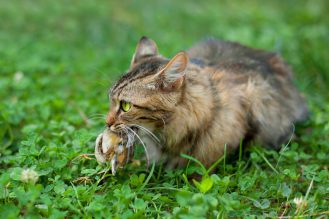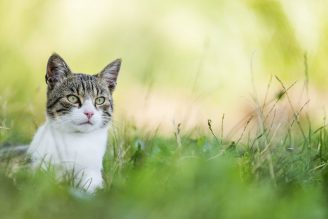Wait a Meow-ment! Don’t be so Quick to let Whiskers Roam Free
Environment | September 20, 2022
While domestic cats make great pets, they can often disrupt natural environments when allowed to roam around outdoors.
Cats are cute, playful and can provide unconditional love. However, when they are let outdoors, can be threatening to birds, smaller animals and other wildlife like reptiles.
Last year, Animal Services received 57 calls about outdoors cats roaming unsupervised. This year so far, they’ve received 32 concerned inquiries.
Domestic cats that are allowed unsupervised outdoor time can be threat a to birds in Canada – with millions of bird attacks happening each year. Cats are equipped with sharp teeth and claws and while they might be domesticated, they have a natural curiosity and desire to hunt and kill. Similar to the way they play with toys, cats can exhibit predatory behaviour often resulting in injuring or killing wildlife.
In addition, cat feces can also transmit and spread deadly diseases like rabies, feline leukemia, parasites and Toxoplasmosis.
While not all outdoor cats are malicious or looking to cause havoc, when they’re roaming, they can be mistaken as a stray or lost and picked up by caring residents and brought to shelters or rescue organizations outside of the city. The best way you can ensure you never lose your precious feline friend is to make sure they are microchipped and supervised at all times when outdoors.
Outdoor or not – what can you do to help?
Keep your cat inside if possible. If your cat needs more enrichment and keeping it indoors isn’t enough, consider building a cat patio, an enclosed outdoor space that allows cats to remain contained while outdoors. If this isn’t possible, supervise your cat and use a leash while outdoors to protect it from busy streets, other cats, weather, injury or other predators. This also protects other wildlife from being injured or killed.
Residents are encouraged to:
- Spay/neuter cats
- Get their pets microchipped, renew or get a pet licence from Animal Services
- Make sure vaccines and shots are up to date
- Keep litter boxes inside
Have issues with outdoor cats visiting your property?
If a neighbourhood cat is causing nuisance issues on your property, you can contact Animal Services at 905-896-5858 to file a complaint. Animal Services will investigate and if the problem persists, further enforcement action will be taken.
You can also keep community cats away from your property by:
- Removing food
- Installing motion-activated sprinklers
- Using scent repellents like coffee grounds or lemon
- Soaking garden soil with water
- Using physical deterrents like rocks or mulch in gardens
- Covering sandboxes when not in use
The City has a trap, neuter, return management (TNRM) program that helps control feral cat colonies in Mississauga. Studies have shown through this process, the populations will slowly decrease. This is the most humane way to address feral cat populations as these cats are used to living outdoors due to being lost, abandoned or born feral. Most feral cats are afraid of people and won’t adapt to being a pet or living in a shelter.
Wanting more information about cats in Mississauga, visit mississauga.ca/services-and-programs/animals-and-pets/community-cats/
Tags
Media contact
City of Mississauga Media Relations
media@mississauga.ca
905-615-3200, ext. 5232
TTY: 905-896-5151



